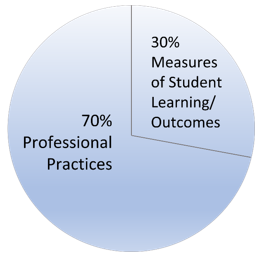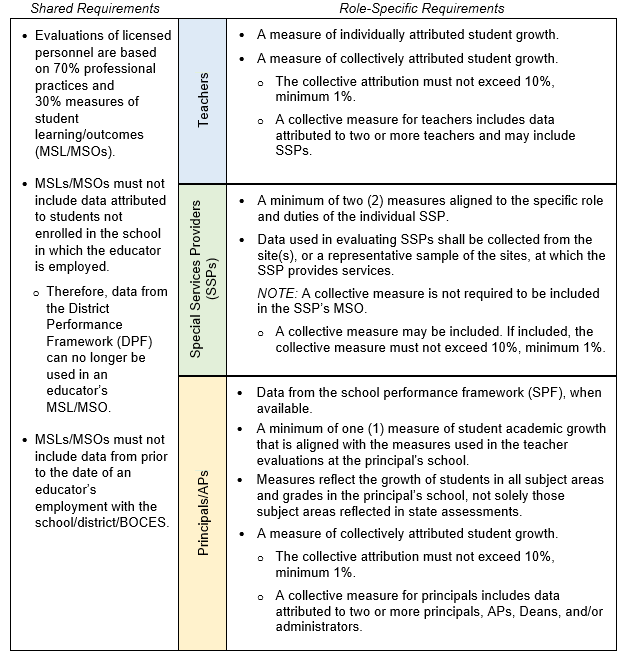CDE will be closed on Friday, July 4, 2025, for the Independence Day holiday.
You are here
Measures of Student Learning/Outcomes (MSLs/MSOs): Overview and Requirements
General Overview of Measures of Student Learning/Outcomes (MSLs/MSOs)
Measures of student learning and outcomes (MSLs/MSOs) are designed to capture the results from an educator's practice. The information below is designed to provide clarity on the requirements, guidance, and considerations related to MSLs/MSOs.
Beginning in the 2023-24 school year thirty percent of a licensed educator’s (i.e., teachers, special services providers [SSPs], and principals/APs) evaluation will be determined by measures of student learning/outcomes (MSLs/MSOs). Therefore, the final effectiveness rating will consist of 70% professional practices and 30% MSLs/MSOs.

School districts and BOCES are strongly encouraged to involve educators at every step of the process to determine the weights and selection of available measures to indicate student learning aligned to the specific educator’s role and student growth goals.

The measures included in an educator’s MSL/MSO provide representation of student learning and growth resulting from the instructional and service delivery practices utilized by the educator. The guidance offered below is aligned with the primary goal of Educator Effectiveness and educator evaluations to provide meaningful feedback that supports educators to continually grow as professionals.
District/BOCES Guide for Creating MSLs/MSOs
This guide is primarily for district/BOCES leaders, including members of the Advisory Personnel Performance Evaluation Council (also known as 1338 Council). This guide outlines a process, including detailed steps, for identifying and determining MSLs/MSOs that align with local values, priorities, and existing educator evaluation systems. Information and examples related to determining success criteria for selected measures are included within the guide.
- CDE encourages districts/BOCES to provide an overview of decisions related to MSLs/MSOs in the required annual orientation for all staff regarding educator evaluations at the beginning of each school year. The EE Regional Specialist Team can assist in customizing to specific district/BOCES needs.
- Districts/BOCES using the Colorado Performance Management System (COPMS) in RANDA can utilize the tools within the system for building MSL/MSO templates as well as to leverage opportunities for input from educators in the creation of their MSLs/MSOs. Additional questions regarding COPMS/RANDA can be directed to copms@cde.state.co.us.
- CDE encourages districts/BOCES to maintain consistent timelines and evaluation processes from year-to-year when possible. The Educator Effectiveness Best Practices Timeline provides a breakdown of when/how to incorporate educator evaluation processes throughout the school year.
- Additional information can be found on the Educator Effectiveness Frequently Asked Questions (EE FAQs) webpage.
Please Note:
In preparation for the 2023-24 school year, the State Model Evaluation System (SMES) scoring system was revised. Highlights of the revised scoring include the following:
- Total points for an educator’s final rating will shift to 1000 (previous total of 1080), with the total points available for the MSL/MSO portion adjusted to 300.
- Revision to the levels available for the MSL/MSO score – reduced from four levels to three. Revised score levels: Less than Expected, Expected, and More than Expected.
- How do teachers, principals, and their evaluators know that students are learning?
- For any given role (e.g., teacher, building leader, or district leader), consider what measures/data demonstrate that students are learning.
- While DPF data is no longer available for inclusion in MSL/MSOs, it presents an opportunity to use other sources of data that may have previously been overlooked to provide information regarding students' learning.
- How could existing/available data be leveraged for use in MSLs?
- How do SSPs and evaluators know that students are progressing towards the desired outcomes? How do they know the students are demonstrating growth?
- How can the school/district/BOCES align the creation of MSLs/MSOs with other areas of focus, e.g., UIP and annual priority areas/goals, among others?
- Which stakeholders are already involved, and which stakeholders could be more involved, in decision-making related to educator evaluations, e.g., Advisory Personnel Performance Evaluation Council (1338 Council), admin team(s), and educators?
- How are the local values of the district/BOCES reflected in the creation of the MSL/MSOs for educators?
- What professional development opportunities would be beneficial to support educators and evaluators to effectively use and leverage MSLs/MSOs in the evaluation process?
Overview of Measures of Student Learning (MSLs)
As part of the statutory requirements for educator evaluation, a portion of the final effectiveness rating (FER) for all licensed personnel must consist of Measures of Student Learning (MSLs) or Measures of Student Outcomes (MSOs). MSLs are data points which directly measure educator impact on student learning. All teachers are required to have at least one individual measure (a measure attributed to the individual teacher) and one collective measure (a measure attributed to two or more teachers) compiled together to create their MSL score. Beginning in the 2023-24 school year, MSLs will comprise 30% of a teacher's total FER.

Note that for the 2022-23 school year, the use of student growth from the Colorado Growth Model or district/school performance frameworks may not be used as a part of licensed personnel's Measure of Student Learning/Outcome (MSL/MSO). All other aspects of the system will remain the same.
There is incredible flexibility afforded to districts/BOCES, schools, and/or educators with regard to the design of their MSLs. Districts/BOCES and/or schools are able to determine the number of measures attributed to educators (between a minimum of 2 and maximum of 5 measures) as well as the weight of those measures. Further, based on local values determined through stakeholder groups such as district/BOCES 1338 councils, there is complete flexibility in what measures are used and how success criteria is designed.
Below, engage in two webinars which are intended to highlight the meaning behind MSLs and how meaningful measures can be determined.
Webinar Part 1: Thinking Through District and School Measures
This recorded webinar is designed to be used with those involved in decision-making in your district/BOCES to determine the measures of student learning and student outcomes (MSLs/MSOs) for the educator evaluation system. This may include and not be limited to district leaders, HR and EE staff, evaluators, and members of your Advisory Personnel Performance Evaluation Council (also known as 1338 Committee). It is designed to be paused and lead to a discussion with your colleagues to ensure a thoughtful determination of your district measures for the 2022-23 school year.
Webinar Resources:
Webinar Part 2: Deepening Understanding and Creating Success Criteria around MSLs and MSOs
This recorded webinar is intended to follow the values-based discussion and determination of MSL/MSOs from the Part 1 webinar. This webinar will deepen understanding around the options for setting success criteria for a variety of student learning measures, and provide opportunities for teams to practice several methods for setting success criteria at both the individual and collective levels.
Webinar Resources:
- Handouts:
- MSL/MSO Part II Slide Deck (PDF)
- Setting Student Learning Targets and Scales Activity
Overview of Measures of Student Outcomes (MSOs)
As part of the statutory requirements for educator evaluation, a portion of the final effectiveness rating (FER) for all licensed personnel must consist of Measures of Student Learning (MSLs) or Measures of Student Outcomes (MSOs). MSOs are data points which directly measure educator impact on students. All Special Services Providers (SSPs) are required to have at least two MSOs. Different from teachers' MSLs, SSPs' MSOs are not required to have both an individual measure (a measure attributed to the individual SSP) and collective measure (a measure attributed to two or more SSPs); the SSP and their evaluator can determine whether both types of measures are appropriate given the role and responsibilities of the licensed person. Beginning in the 2023-24 school year, MSOs will comprise 30% of an SSP's total FER.

Note that for the 2022-23 school year, the use of student growth from the Colorado Growth Model or district/school performance frameworks may not be used as a part of licensed personnel's Measure of Student Learning/Outcome (MSL/MSO). All other aspects of the system will remain the same.
There is incredible flexibility afforded to districts/BOCES, schools, and/or SSPs with regard to the design of their MSOs. Districts/BOCES and/or schools are able to determine the number of measures attributed to SSPs (between a minimum of 2 and maximum of 5 measures) as well as the weight of those measures. Further, based on local values determined through stakeholder groups such as district/BOCES 1338 councils, there is complete flexibility in what measures are used and how success criteria is designed.
Below, engage in two webinars which are intended to highlight the meaning behind MSOs and how meaningful measures can be determined.
Webinar Part 1: Thinking Through District and School Measures
This recorded webinar is designed to be used with those involved in decision-making in your district/BOCES to determine the measures of student learning and student outcomes (MSLs/MSOs) for the educator evaluation system. This may include and not be limited to district leaders, HR and EE staff, evaluators, and members of your Advisory Personnel Performance Evaluation Council (also known as 1338 Committee). It is designed to be paused and lead to a discussion with your colleagues to ensure a thoughtful determination of your district measures for the 2022-23 school year.
Webinar Resources:
Webinar Part 2: Deepening Understanding and Creating Success Criteria around MSLs and MSOs
This recorded webinar is intended to follow the values-based discussion and determination of MSL/MSOs from the Part 1 webinar. This webinar will deepen understanding around the options for setting success criteria for a variety of student learning measures, and provide opportunities for teams to practice several methods for setting success criteria at both the individual and collective levels.
Webinar Resources:
- Handouts:
- MSL/MSO Part II Slide Deck (PDF)
- Setting Student Learning Targets and Scales Activity
Examples of Measures of Student Outcomes (MSOs)
- The Measures of Student Outcomes PowerPoint takes a deep dive into the steps for determining Measures of Student Outcomes (MSOs).
- Sample Measures of Student Outcomes have been created by work group members to provide a starting point for SSPs, their evaluators, and districts/BOCES as they make decisions about their evaluation system.
- Download sample measures of student outcomes for Audiologists
- Download sample measures of student outcomes for Occupational Therapists
- Download sample measures of student outcomes for Physical Therapists
- Download sample measures of student outcomes for School Counselors
- Download sample measures of student outcomes for School Nurses
- Download sample measures of student outcomes for School Orientation and Mobility Specialists
- Download sample measures of student outcomes for School Psychologists
- Download sample measures of student outcomes for School Social Workers
- Download sample measures of student outcomes for Speech Language Pathologists
- The Student Target and Scale Setting Activity walks participants through the steps in determining a target and scale based on given sets of data.
Additional Support and Training Materials
The following are additional resources and supports to districts/BOCES related to MSL/MSOs:
Contact Your Educator Effectiveness Regional Specialist
Local Examples of MSLs/MSOs from the Field






Connect With Us





